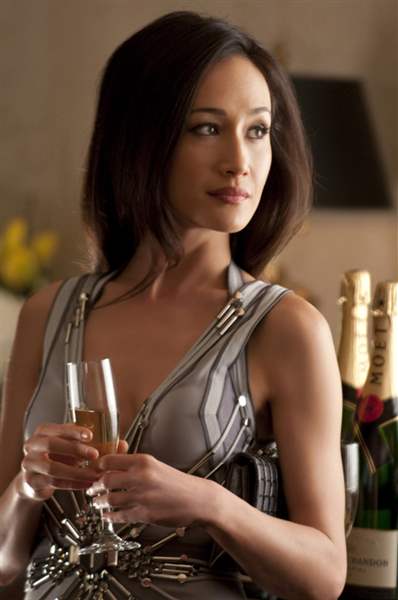
Action heroes: Tough, fearless, and female
3/20/2011
Maggie Q stars in the television series ‘Nikita.’
ASSOCIATED PRESS

Cote de Pablo plays Ziva David on the CBS show 'NCIS.'
Brennan acknowledges the visceral thrill to be had — on whatever level you care to have it — from watching a woman, rather than a man, pound heads or pump bullets. "We try to deliver that, but we try to be credible about it," he said. "You'll never see her leap in the air and do the splits and kick two guys at the same time. Save that for the John Woo movie.
"Shooting two guys at the same time is not a problem, though. Fans of the show recall fondly a short scene in Season 6, in the episode "Dead Reckoning," when Ziva (played by the Chilean-born actress Cote de Pablo) spotted two suspicious men entering the government safe house where she was protecting a witness. Putting down the cell phone on which she was talking to headquarters, she pointed guns at each of the room's two doors. A few seconds later, as the smoke cleared, she picked up the phone: "Under control."
With her credible combination (by prime-time standards) of physical domination and quiet cool, David is one of the most appealing of a growing group of female action heroes who are infiltrating cop shows, spy shows, science-fiction shows, and other genres where men once did the lion's share of the enforcing.
It's not a new role -- the prototypes go back at least 50 years, to Diana Rigg in The Avengers, and include Charlie's Angels, Buffy the Vampire Slayer, and Alias. What feels different now is the degree to which action women have become an unremarkable part of the television landscape. In some cases they're the stars, on Nikita, Chase, V, and other current shows. But they also appear, often in more interesting, less predictable fashion, as ensemble or supporting characters.

Maggie Q stars in the television series ‘Nikita.’
Plenty of reasons could be proposed for the proliferation of these characters, including the overall softening of the action star following the 1980s heyday of Sylvester Stallone and Arnold Schwarzenegger's cartoonish, ultra-macho film heroes. Craig Silverstein, who developed the new Nikita series for CW, recalled the original 1990 French film La Femme Nikita as a "cult antidote" to those excesses.
This goes along with a desire on the part of many creators to cross up gender and racial stereotypes if it can be done without too much trouble, which can also be seen in the perhaps disproportionate number of television squad rooms and investigative teams led by African-Americans (almost always as secondary characters).
The main impulse, though, is most likely economic: producers' ever-growing realization that they need to appeal to female viewers -- the decision makers when it comes to television viewing -- in every kind of programming.
"I think one of the reasons that it's popular and it works in general is that for a woman warrior there's a juxtaposition of nurturer and destroyer that creates a natural added tension," said Silverstein, who radically changed the Nikita story line, giving the isolated assassin a younger female protege who serves as her mole within the government. "And as far as Hollywood goes, I think that juxtaposition is a good way for an action show to appeal to both the male and female audience."